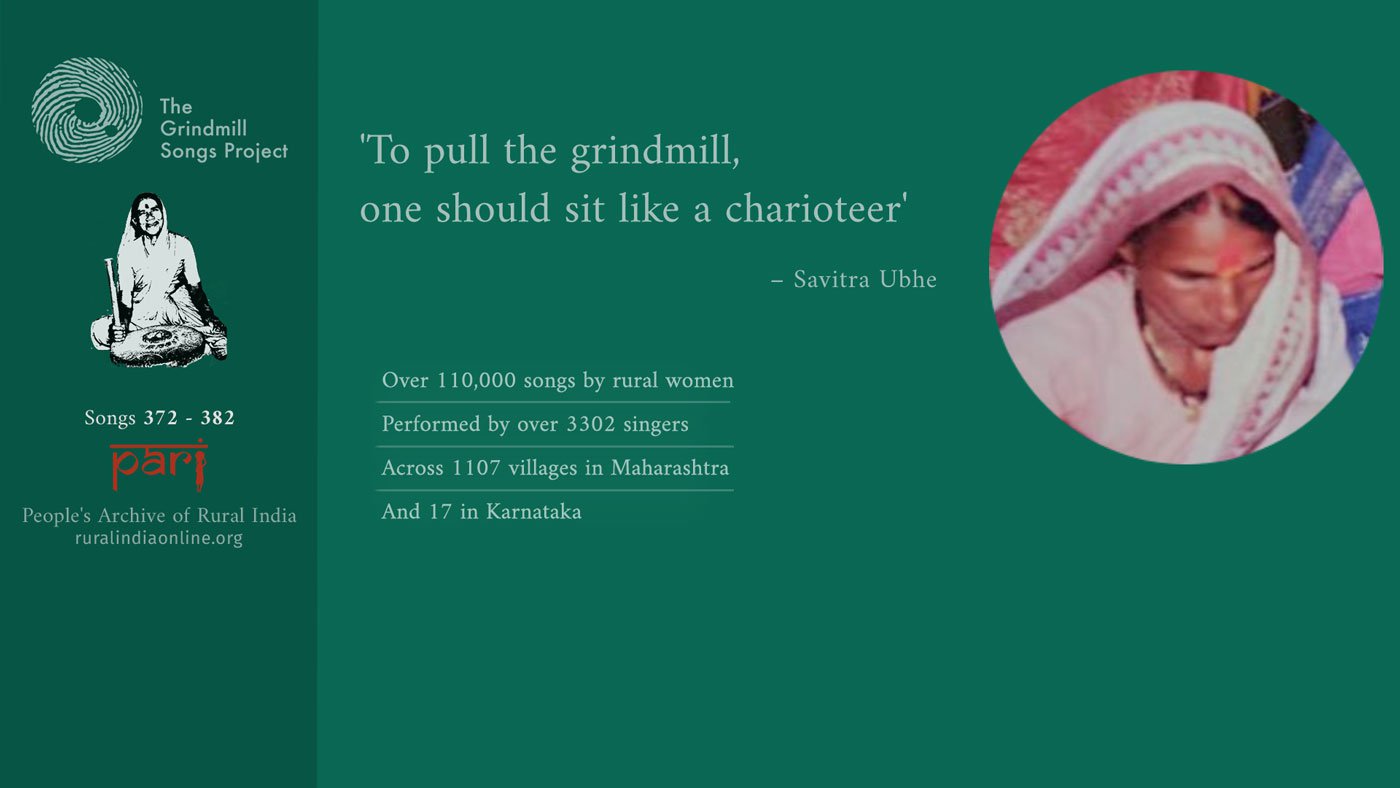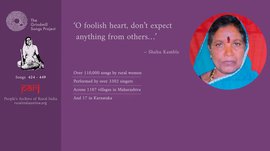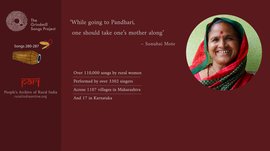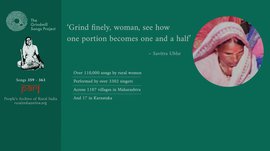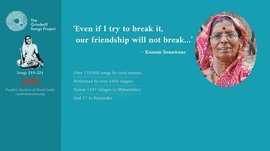Savitra Ubhe sings 11 couplets about the daily task of grinding grains, and the tricks to make it easy – all the while remembering her mother, who made her strong for the hard labour
“Give a roll of betel leaf to your brother, give it to your beloved friend,” a wise woman at the grindmill advises another whose brother is sulking. The words emerge like the rhythm of drumbeats from Savitra Ubhe as she sings a refrain interlacing her
ovi
:
Jasmine tree, heavily laden with buds
A woman plucks, strings a garland
A beautiful visage, the moon’s arc
Yet, the parrot on the tree is silent
In this forest, why is there no water?
O Radhika, give a betel leaf roll to your brother
O Radhika, give a betel leaf roll to your beloved friend
Has the woman tied a string of the jasmine buds in her hair or has she made a fragrant garland to offer it to her beloved friend? Both look beautiful like the moon’s arc. Either way, she is trying to pacify the silent raghu , parrot, on the tree, who symbolises the man.
The lack of water in the forest is a metaphor for the absence of contentment even amidst the beautiful surroundings. Perhaps they have had yet another quarrel and it is his turn to sulk and hers to appease him. Offering him a betel leaf roll might please him. And we wonder if this is the same woman about whom Savitrabai sang in another set of
ovi
:
A sister’s anguish, a brother’s worry
.
The woman offers the man a
vida
– a rolled betel leaf filled with shavings of betel nut and dabs of catechu and white lime. It is a sign of welcoming him with love, and the image is often used in folklore to portray
shringara rasa
, romantic love.
In her signature style, Savitrabai sings the refrain after each line of the
jatyavarchi ovi
, grindmill songs. But the other women present complain it is too long. “We cannot remember so many words between two lines,” they say, protesting in a friendly way.

These couplets celebrate the strength applied by women in wielding the grindmill
The women go on chatting and laughing in the background. Savitrabai continues to sing, though not unmindful of their comments. After the first few couplets, she changes the tune a little, and then drops the rather long but beautiful refrain.
In these songs, Savitrabai sings of a woman’s unparalleled strength in wielding the grindmill, described as a hillock of black corundum stone. The hard stone crushes big mounds of grain for the woman’s large family that includes her husband, daughter, son and daughter-in-law. The singer celebrates the energy of women, whose labour makes their family prosper: “a mother-in-law and daughter-in-law are grinding on the terrace which has seven sections.” This tells us that it is a big house of a prospering family.
The women in charge are strong. They are riding a chariot – not an ordinary one at that, but the two-wheeled carriage of the grindmill. The older woman explains to her daughter that it is when she sits like a charioteer, and uses all the strength of her youth, that the grindmill will “flow as easily as water would between the two of us.”
It is hard labour, and with constant grinding and pounding, the woman’s hands have become pale. She is dripping in sweat. But the strength to do this work has come to her from her mother's milk, as sweet as honey, which she drank as an infant, and from the generous doses of nutmeg paste she was made to eat as a child.
In this collection, the third and final set of Savitra Ubhe’s 23 songs for the Grindmill Songs Project, she leaves a small, expert tip for younger women working at the grindmill. One does not need to move the whole body while grinding, the singer says, “my dear woman, hold the stick firmly in your hand, against your wrist.”
Listen to her powerful voice:
सरील दळयाण मला आणिक घेणं आलं
आता बाळा गं ह्यानी माझ्या, बाप लेकानी येणं केलं
असं दळणं दळीतं, सूप भरुनी दळयातं
आताना माझा राघू शाळेला जायचा
जातना गं काही नव्ह बाई डोंगराचा परबतु
खंड्याच्या खंड्या दळी बाळ माझा संबरतु
असं दोन बाईकाचा रथ कुणाच्या गं वाड्यामधी
दळीतात सासू सुना सात खणाच्या गं माडीमधी
जात काही नव्ह डोंगरीचा परबतु
खंड्याच्या खंड्या दळी बाळ माझा संबरतु
असं जातं काही नव्ह बाई काळा कुरुंद खाणीयीचा
अशा गवळण माझ्या बाई भर आपल्या ज्वानीचा
असं जातं वढायाला काय बसावं हल्यावाणी
असं दोघींच्या मधून रथ चालला पाण्यावाणी
असं जातं वढावं नखा बोटाच्या आगयळी
असं बयाचं पेले दूध जसं मधीच्या सागयळी
असं दळता कांडता घाम गळतो वाटीलोटी
अशी बयानी दिली घुटी जायफळाची मुठीमुठी
अशी दळता कांडता माझी तळहात पिवयळी
अशी बयानी दिली गुटी जाईफळाची कवयळी
अगं असं जातं वढताना अंग कशाला हलयावा
अशी माझ्या बाया खुटा मनगटी तोलायावा
गळा
जाईच झाड, कळीचा भार,
तोडीती नार, गुंफीती हार
सुरत अनिवार, चंद्राची कोर
झाडावरीला राघू, बोलना काही
वनाच्या ठायी, पानी का नाही
बंधुला विडा देगं, राधिका बाई
सख्याला विडा देगं, राधिका बाई
sarīla daḷāṇa malā āṇika ghēṇa āla
bāḷāgayāna mājhyā bāpa lēkānī yēṇa kēla
daḷaṇaṁ daḷītaṁ sūpa bharunī daḷataṁ
ātānā mājhā rāghū śāḷēlā jāyacā
jāta navha bāī ḍōṅgarācā parabata
khaṇḍyācyā khaṇḍyā daḷī bāḷa mājhā sambarata
dōna bāīkācā ratha kuṇācyā vāḍyāmadhī
daḷītāta sāsū sunā sāta khaṇācyā vāḍyāmadhī
jāta kāhī navha ḍōṅgarīcā parabatu
kaḍyācyā kāḷubāī bāḷa mājhā sambaratu
jāta navha bāī kāḷā kurunda khāṇīyīcā
gavaḷaṇa mājhyā bāī bhara āpalyā jvānīcā
jāta vaḍhāyālā kāya basāva halyāvāṇī
dōghīñcyā madhūna ratha cālalā pāṇyāvāṇī
jāta vaḍhāva nakhā bōṭācyā āgayaḷī
bayāca pēlē dūdha jasa madhīcyā sāgaḷī
daḷatā kāṇḍatā ghāma gaḷatō vāṭīlōṭī
bayānī dilī ghuṭī jāyaphaḷācī muṭhīmuṭhī
daḷatā kāṇḍatā mājhī taḷahāta pivayaḷī
bayānī dilī guṭī jāīphaḷācī kavayaḷī
aga asa jāta vaḍhatānā aga kaśālā halavāyā
ātā mājhyā bāyā khuṭā managaṭī tōlāyāvā
gaḷā
jā'īca jhāḍa, kaḷīcā bhāra,
tōḍītī nāra, gumphītī hāra
surata anivāra, candrācī kōra
jhāḍāvarīlā rāghū, bōlanā kāhī
vanācyā ṭhāyī, pānī kā nāhī
bandhulā viḍā dēgaṁ, rādhikā bā'ī
sakhyālā viḍā dēgaṁ, rādhikā bā'ī
My grinding is over, but I had to take more grains
Both my brother and father are here
I’m grinding till the sifting pan is full of flour
My dear son will go to school now
It’s not a grindmill, it’s like a hillock
It crushes mounds and mounds of grain; my son is rich and prosperous
In whose house is the chariot of two women?
Mother-in-law and daughter-in-law are grinding
On the terrace with a wall of seven sections
It’s not a grindmill, it’s like a hillock
It grinds kilos and kilos of grains; my son is rich and prosperous
Woman, this is not a grindmill, it is black corundum from the mine
My dear daughter, you have the strength of your youth
To pull the grindmill, one must sit like a charioteer
Between the two of us, the chariot will flow like water
To pull the grindmill, with the force of one’s fingers and nails
I have drunk my mother’s milk, like vessels filled with honey
Grinding and pounding, sweat is dripping in bowlfuls
My mother fed me a paste of handfuls of nutmeg
Grinding and pounding, my palms become yellow
My mother fed me a fresh paste of nutmeg
To pull the grindmill, why should you move your whole body
Now, my dear woman, you should hold the handle firmly against the wrist
The refrain
Jasmine tree, heavily laden with buds
Woman plucks, strings a garland
A beautiful visage, like the moon’s arc
Yet, the parrot on the tree is silent
In this forest, why is there no water?
O Radhika, give a betel leaf roll to your brother
O Radhika, give a betel leaf roll to your beloved friend

Performer/Singer: Savitra Ubhe
Hamlet:
Khadakwadi
Village:
Kolavade
Taluka:
Mulshi
District:
Pune
Caste:
Maratha
Date:
The songs were recorded on June 1, 1996
Poster: Urja
Listen to more songs by Savitra Ubhe:
A woman’s work and sweat for prosperity
and
A sister’s anguish, a brother’s worry
.
Read
about the original Grindmill Songs Project founded by Hema Rairkar and Guy Poitevin.
